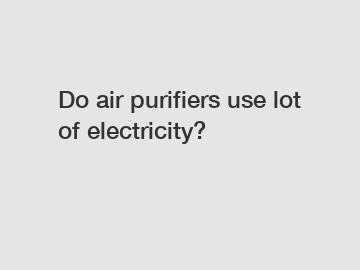Do air purifiers use lot of electricity?
Do air purifiers use a lot of electricity? As people become more concerned about indoor air quality, the popularity of air purifiers continues to grow. However, some individuals may be hesitant to invest in these devices due to concerns about their potential impact on electricity consumption. In this article, we will explore the electricity usage of air purifiers and discuss various factors that can influence their energy consumption.
1. Power Consumption: One of the primary concerns regarding air purifiers is their energy usage. While it is true that air purifiers consume electricity, the amount of power they use varies depending on several factors. Generally, air purifiers range from 30 to 250 watts of power consumption, which is comparable to other household appliances like LCD TVs or desktop computers.
2. Size and Efficiency: The size and efficiency of an air purifier play a significant role in determining its power consumption. Larger air purifiers with higher Clean Air Delivery Rates (CADR) generally require more electricity to operate. On the other hand, smaller, more compact models with lower CADR ratings tend to consume less power. Therefore, it is essential to consider the space you want to purify and choose an air purifier that suits your specific needs to optimize energy efficiency.

3. Fan Speed and Settings: The fan speed and settings of an air purifier can significantly impact its electricity consumption. Higher fan speeds often result in more air being processed, but they also consume more power. Some air purifiers have adjustable fan speeds or automatic sensors that adjust the fan speed based on air quality. Choosing appropriate settings based on the air quality in your environment can help optimize energy usage while ensuring effective purification.
4. Continuous Operation: Many air purifiers are designed to operate continuously to maintain optimal indoor air quality. While constant operation ensures that the air is continuously filtered, it also means increased electricity consumption. However, it is worth noting that most air purifiers are energy-efficient, and their power consumption may not be as significant as one might anticipate. Additionally, some models feature energy-saving modes or timers that can help reduce energy usage without compromising air quality when continuous operation is not necessary.
5. Energy Star Certification: When considering energy-efficient air purifiers, look for models with the Energy Star label. Energy Star-certified air purifiers are independently tested for their efficiency and consume less energy compared to standard models. These certified devices use approximately 40% less energy while delivering the same performance. Investing in an Energy Star-certified air purifier can help mitigate concerns about high electricity usage.
6. Other Energy-Saving Tips: Besides choosing an energy-efficient model, there are other strategies to minimize the electricity consumption of your air purifier. Placing the device in a suitable location can optimize its effectiveness, reducing the need to run it at high speeds. Keeping windows and doors closed while the air purifier is operating prevents the unit from working harder to compensate for external pollutants. Additionally, regularly cleaning or replacing the air filters ensures that the device operates efficiently, reducing unnecessary energy consumption.
In conclusion, while air purifiers do consume electricity, their energy usage can vary depending on factors such as size, efficiency, fan speed, and settings. However, concerns about excessive electricity consumption should not discourage individuals from investing in air purifiers, as most models are energy-efficient and consume power comparable to other household appliances. By choosing the appropriate air purifier size, optimizing fan speed and settings, considering continuous operation needs, and looking for Energy Star certification, you can minimize the device's electricity consumption. Ultimately, these devices play a crucial role in improving indoor air quality and promoting a healthier living environment.
Are you interested in learning more about ac lcd display, TN Household Air Conditioner LCD Screen, Ultra-low Power Consumption Electricity Meter Panel? Contact us today to secure an expert consultation!


